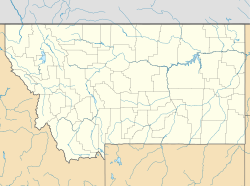Sleeping Buffalo Rock
Sleeping Buffalo Rock | |
 | |
| Location | Junction of U.S. Route 2 and Montana Highway 243, Saco, Montana |
|---|---|
| Coordinates | 48°28′10″N 107°32′56″W / 48.46944°N 107.54889°W |
| Area | less than one acre |
| NRHP reference No. | 96000548 |
| Added to NRHP | May 17, 1996[1] |
Sleeping Buffalo Rock is a site on the National Register of Historic Places located near Saco, Montana. It was added to the Register in 1996.[1][2]
The placard reads:
A nearby wind-swept ridge overlooking the Cree Crossing on the Milk River was the original resting place of this ancient weather-worn effigy. There the boulder sat as the leader of a herd of reclining buffalo envisioned in an outcrop of granite. Incised markings made in the distant past define its horns, eyes, backbone, and ribs. Since late prehistoric times, native peoples of the Northern Plains have revered the Sleeping Buffalo's spiritual power. Oral traditions reveal that it was well known to the Cree, Chippewa, Sioux, Assiniboine, and Gros Ventre as well as the more distant Blackfeet, Crow, and Northern Cheyenne. Stories passed from generation to generation tell how the "herd" fooled more than one buffalo-hunting party. While each tribe has its own culture and beliefs, native peoples share a worldview intertwining the sacred and secular. A Chippewa-Cree elder explained, "These rocks are sacred, just like our old people." In 1932, the Sleeping Buffalo was separated from its ridgetop companions. Relocated to the City Park in Malta, the Sleeping Buffalo was said to have been restless; stories are told of its changing position and nighttime bellowing. Moved to this site in 1967 from old Highway 2, the Sleeping Buffalo was later rejoined by the larger "Medicine Rock" in 1987, also collected near Cree Crossing. These timeless objects continue to figure prominently in traditional ceremonies. They provide a link to ancestral peoples of the high plains and the long ago time when, as one elder put it, "The power of the prairie was the buffalo."[3]
Popular culture
[edit]The monument provides the setting in "Sleeping Buffalo", a song by Canadian folk musician Garnet Rogers.
References
[edit]- ^ a b "National Register Information System". National Register of Historic Places. National Park Service. July 9, 2010.
- ^ Chere Jiusto (January 1996). "National Register of Historic Places Inventory/Nomination: Sleeping Buffalo Rock". National Park Service. Retrieved August 11, 2017. With five photos from 1996.
- ^ A placard


